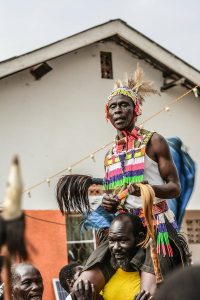
Uganda is emerging as a popular tourist destination because it provides the kind of off-the-beaten-path experience that many travelers yearn for. A first trip to Uganda will leave you in awe, whether you’re most excited about exploring the country’s various national parks or embarking on a mountain gorilla trek to observe these endangered primates in their natural habitat. This country has a mild climate, a beautiful green countryside, and organic food. It is also much safer than the news makes it out to be and has some of the friendliest people on the planet.
Have a burning curiosity?
In order to help you plan your trip and fall in love with Uganda, we have compiled the following article.
Ugandan currency
Ugandan shillings (abbreviated UGX) are the official currency of Uganda. The currency symbol for the Ugandan shilling is USh. Ugandan currency can only be minted, distributed, and destroyed by the Bank of Uganda. The coins range in value from 50 to 1,000 shillings. Notes used are 1,000, 2,000, 5,000, 10,000, 20,000, and 50,000 Ugandan shillings. In addition to Ugandan shillings, major foreign currencies like the US dollar, euro, and pound can be used for payments, especially at larger hotels and travel agencies. On December 29, 2020, 1 USD was worth approximately UGX 3,490, 1 GBP was worth approximately UGX 4,913, and 1 EUR was worth approximately UGX 4,455.
Some people, especially in rural areas (where the country’s national game parks are nestled), will not accept foreign currency for payments, so visitors are advised to change some money to local currency before venturing outside of the major cities and towns.
LANGUAGE
The four major ethnic groups in Uganda come from various places. Some examples of these are the Bantu, Nilotic, Nilo-Hamitic, and Hamite peoples. Buganda, Banyankole, Basoga, Bakiga, Batoro, Banyoro, Banyarwanda, Bagisu, Bagwere, and Bakonjo are just a few of the Bantu tribes. The country is home to more than 50 distinct ethnic groups, each of which uses its own language.
NAMING
Until the colonial era, when the scramble and partition of Africa began, Uganda was a splintered state consisting of a number of independent kingdoms.
Uganda is the name given by the British colonial government. Although the official reasoning behind choosing the name “Uganda” has never been disclosed, the name is widely believed to have been inspired by Buganda, the country’s most powerful kingdom at the time.
Key Points of Interest
Natural features abound in Uganda, including mountains, forests, valleys, and water. Because of its reputation as a naturally endowed nation, this is the case.
Clearly, Uganda’s national parks safeguard the country’s most precious natural resources, such as the critically endangered mountain gorillas in Bwindi Impenetrable and Mgahinga Gorilla National Parks, the common chimpanzees in Kibale Forest National Park, the rare and exotic tree-climbing lions in Queen Elizabeth National Park, the impressive Kazinga Channel in Queen Elizabeth National Park, the enormous Murchison Falls in Murchison Falls National Park.
The Nile River, the world’s longest, is thought to have originated in the city of Jinja, located in eastern Uganda. Lake Victoria, the second-largest freshwater lake in the world, is also one of the unique attractions in this fantastic nation.